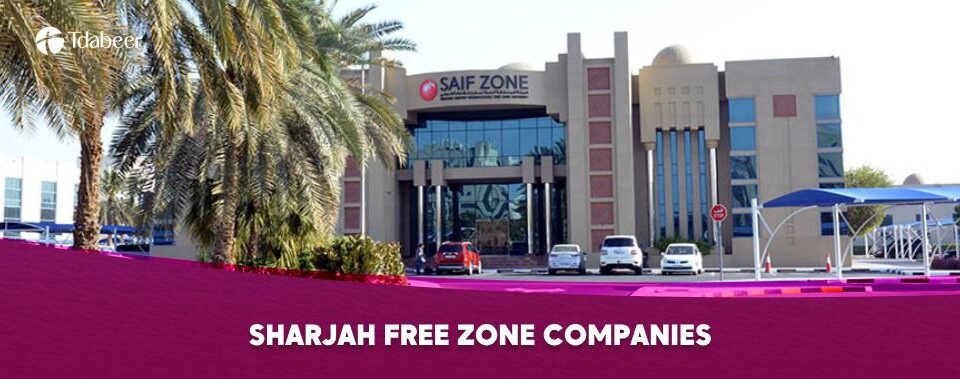
Introduction to Sharjah Free Zones
Sharjah, one of the seven emirates of the UAE, has become a vibrant business hub due to its strategic location, affordability, and diverse range of free zones. Unlike Dubai, which is often seen as a more expensive option, Sharjah offers cost-effective alternatives for startups, SMEs, and larger corporations alike. By establishing a company in one of Sharjah’s free zones, businesses can take advantage of significant tax breaks, full foreign ownership, and a streamlined setup process.
Types of Free Zones in Sharjah
Sharjah boasts several free zones catering to different industries and business needs. Let’s take a closer look at the primary free zones:
1. Sharjah Airport International Free Zone (SAIF Zone)
SAIF Zone is one of the most established free zones in the UAE, located near Sharjah International Airport. It is ideal for companies involved in logistics, import/export, and industrial activities.
2. Hamriyah Free Zone (HFZ)
Known for its focus on manufacturing and heavy industries, Hamriyah Free Zone offers access to deep-water ports and a dedicated industrial area. It is popular with companies in oil and gas, manufacturing, and maritime services.
3. Sharjah Media City (Shams)
Shams is a newer free zone dedicated to the media, creative, and digital industries. Entrepreneurs in fields like film production, marketing, and content creation will find Shams an excellent fit.
4. Sharjah Publishing City (SPC)
SPC is the world’s first publishing free zone, catering specifically to businesses involved in book publishing, printing, and related services.
Key Benefits of Setting Up a Company in Sharjah Free Zones
Sharjah-free zones offer several attractive benefits for investors:
1. 100% Foreign Ownership
Like other UAE free zones, companies in Sharjah enjoy full ownership without the need for a local partner or sponsor, giving investors complete control of their businesses.
2. Tax Exemptions
Free zone companies in Sharjah benefit from exemptions on corporate and income tax. Additionally, many companies are VAT exempt, depending on their business activities.
3. Repatriation of Profits
You can repatriate 100% of your profits and capital without restrictions, making it easier to move funds internationally.
4. Strategic Location
Sharjah’s proximity to key global markets, including Dubai and access to both seaports and an international airport make it an ideal location for businesses engaged in trade and logistics.
Industries That Thrive in Sharjah Free Zones
Several industries are well-suited to the free zones in Sharjah:
- Manufacturing and Logistics: SAIF Zone and Hamriyah Free Zone provide access to state-of-the-art facilities for manufacturers and logistics companies.
- Media and Publishing: Sharjah Media City and Sharjah Publishing City are ideal for creative professionals, from filmmakers to authors and publishers.
- Trade and Export: Companies involved in import/export benefit from Sharjah’s competitive rates and access to shipping and air freight.
Sharjah Free Zone Company Structures
When setting up a company in a Sharjah-free zone, you can choose from several business structures:
1. Free Zone Establishment (FZE)
A single-shareholder company, ideal for individual investors or small businesses.
2. Free Zone Company (FZC)
A company with 2 to 5 shareholders, suitable for small-to-medium enterprises.
3. Branch of a Foreign Company
International businesses can establish a branch in Sharjah without needing to form a new entity, maintaining the same legal structure as their parent company.
Types of Licenses Available in Sharjah Free Zones
Each Sharjah free zone offers a variety of licenses depending on your business activity:
1. Trading License
For businesses engaged in trading goods such as import, export, and general trade.
2. Industrial License
Manufacturing and production companies can apply for this license, which allows them to produce goods within the free zone.
3. Service License
Ideal for companies offering professional services like consultancy, IT, or legal services.
4. Media License (Shams)
For businesses involved in media, digital content, and advertising, the media license from Shams is the perfect fit.
Step-by-Step Guide to Setting Up a Free Zone Company in Sharjah
Setting up a business in Sharjah’s free zones is straightforward, with the following steps:
1. Choosing the Right Free Zone
Select the free zone that best aligns with your business activities. For example, Hamriyah Free Zone is perfect for manufacturing, while Shams is ideal for media companies.
2. Application Process
Submit an application to the respective free zone authority. This typically includes choosing your company name, business activity, and license type.
3. Document Requirements
Prepare and submit all required documents, such as passport copies, a business plan, and proof of address.
4. Leasing Office Space
You may need to lease physical office space, depending on the free zone’s requirements. Some free zones offer virtual office packages for certain business types.
Required Documents for Setting Up a Sharjah Free Zone Company
The documentation required can vary depending on the free zone, but commonly includes:
- Passport Copy of the shareholder(s)
- Business Plan
- Proof of Address (for some free zones)
- Articles of Association (for Free Zone Companies or branches)
Costs Involved in Setting Up a Sharjah Free Zone Company
The costs associated with setting up a free zone company in Sharjah include:
- License Fees: Varies based on the type of business and license.
- Office Rental Costs: Depends on the type of office space (virtual, shared, or dedicated).
- Other Administrative Fees: Including visa processing and document attestation.
How to Open a Bank Account for a Sharjah Free Zone Company
To open a bank account for your Sharjah free zone company, you will need:
- Your business license
- Passport copies of the shareholders
- Proof of residency (in some cases)
- Company incorporation documents
Sharjah Free Zone Office Solutions
Sharjah free zones provide a variety of office solutions depending on your business needs:
- Types of Office Space Available: Virtual offices, shared spaces, or fully equipped private offices.
- Warehouse and Industrial Space: Available in SAIF Zone and Hamriyah Free Zone for businesses needing storage or manufacturing facilities.
- Virtual Office Options: Shams and other zones offer virtual office solutions for freelancers and small businesses.
Challenges Faced by Companies in Sharjah Free Zones
While Sharjah-free zones offer many benefits, some challenges include:
- Business Setup Delays: Documentation or approval delays can slow down the setup process.
- Limited Mainland Trading Opportunities: Free zone companies are restricted from trading directly in the UAE mainland without a local distributor or agent.
- Visa and Employee Sponsorship Challenges: Limited visa quotas in some free zones may restrict hiring plans.
How to Renew a Sharjah Free Zone License
Sharjah free zone licenses need to be renewed annually.
- Renewal Process: Submit renewal applications through the free zone authority.
- Required Documents: Include updated trade license, office lease agreement, and proof of business activity.
- Consequences of Late Renewals: Delayed renewals may result in fines or suspension of business activities.
Tax Implications for Sharjah Free Zone Companies
Companies in Sharjah’s free zones enjoy various tax benefits:
- VAT Regulations: VAT exemptions may apply, particularly for export-oriented businesses.
- Corporate Tax Exemptions: Most free zone companies enjoy zero corporate tax.
- International Tax Treaties: UAE has signed numerous tax treaties, benefiting businesses that operate internationally.
Employment Laws and Visa Sponsorship in Sharjah Free Zones
Hiring employees in Sharjah free zones is subject to the following:
- Visa Application Process for Employees: The company must sponsor employees, with quotas depending on the size of the office.
- Labor Laws and Employment Contracts: Free zone companies must comply with UAE labor laws, including minimum salary requirements and employee benefits.
- Employee Benefits and Regulations: Companies must provide health insurance, leave entitlements, and other benefits as per UAE law.
Sharjah Free Zone vs. Dubai Free Zones
Many investors compare Sharjah and Dubai free zones. Here’s how they differ:
Cost Comparison
Sharjah-free zones generally offer more affordable licensing and rental fees compared to Dubai.
Licensing and Business Setup Differences
Sharjah-free zones have simpler setup procedures and fewer bureaucratic hurdles.
Proximity to Key Markets
While Dubai has better global connectivity, Sharjah’s proximity to Dubai and its lower costs make it attractive for many businesses.
Setting up a business in one of Sharjah’s free zones provides numerous benefits, from tax exemptions to full foreign ownership. Whether you’re in manufacturing, media, or trade, Sharjah offers competitive advantages and a favorable business environment. While there are challenges, especially around mainland trading and employee visas, the benefits of operating in a Sharjah-free zone make it a compelling choice for investors.







